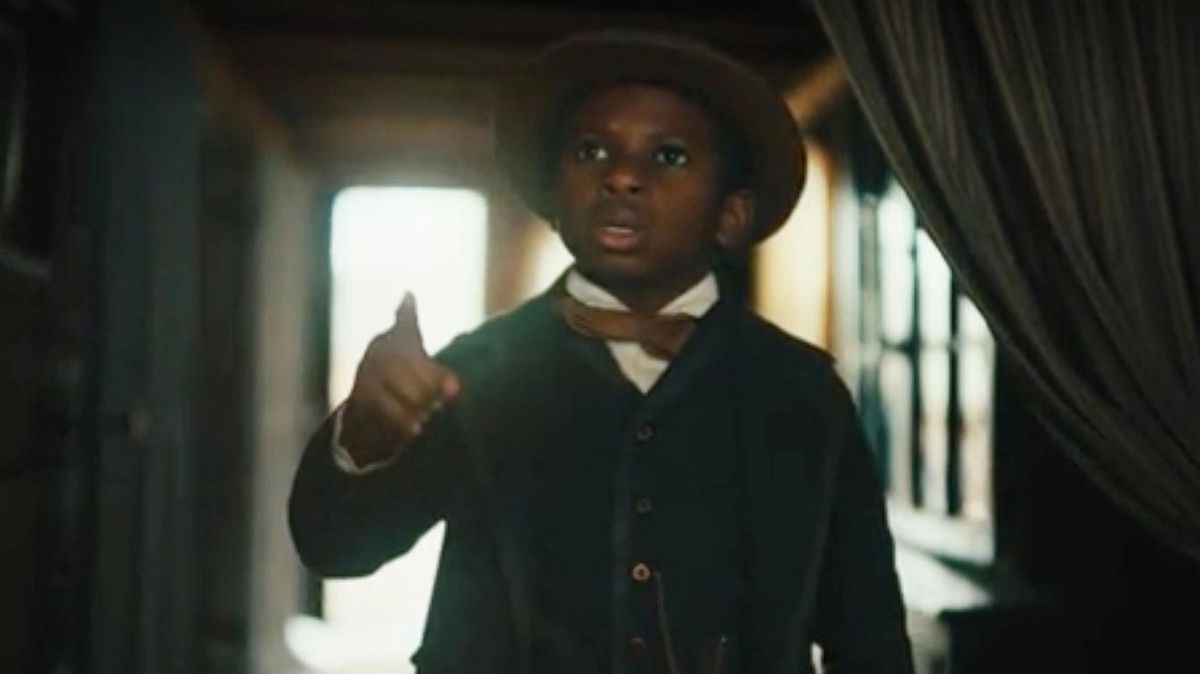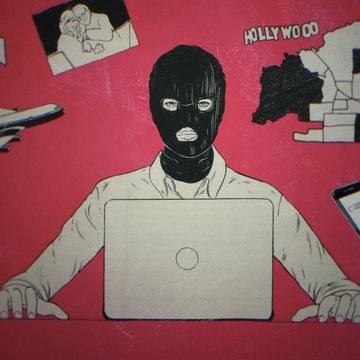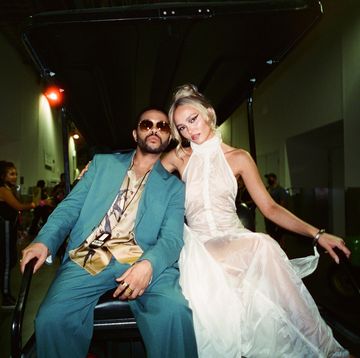What do the big moments in life sound like when you're stood in the middle of them? A Black couple are finally allowed to rent an apartment together in Seventies New York and shout to the sky with joy. A boy sits close to the friend he cannot voice his feelings for on a moonlit beach. A runaway slave from a plantation looks up to see a skyscraper towering over South Carolina. The eldest son of an American media empire watches his father reject him, for all the world to see.
For Nicholas Britell, the Emmy-award winning composer of the Succession theme, and a frequent collaborator with directors Barry Jenkins and Adam McKay, the question of how the biggest beats of your life should sound is an art, not a science. "There’s no rulebook on where to put music," he says over Zoom from New York. "There are things people might commonly do, maybe someone’s travelling from A to B and you put music there. Those are tropes that exist but aren't necessarily the right answer."
When he was working on Moonlight, Jenkins's 2016 Oscar-winner, for which the score was also nominated, the pair felt it was important for there to be no music in the last scene, in which Black sits in Kevin's apartment. "We didn't want anything to be between the audience and the characters," he says. "It's only at the very end of that sequence that you start to hear a piece of music and you know something is happening."
Britell has built a career on creating the kind of stirring scores which linger in the ether of films, like air the characters breathe: the chorus of horns which drift through Jenkins' If Beale Street Could Talk, or the war march of Dick Cheney in Adam McKay's Vice. In Moonlight, Britell's track 'The Middle of the World' is a flurry of strings against the bobbing waves as Juan holds Little's body in the sea, the music hinting at the danger he is teaching this boy to survive.
Britell, who is 40, grew up on the Upper West Side of New York City, and can trace his interest in film scores back to a time when he would put on CDs of John Williams' music and act out movie scenes in the living room with his younger brother. "I was so entranced by that music that I went to this old upright piano we had in our apartment and I tried to figure it out," he says of the moment he first heard the 'Vangelis' opening of Chariots of Fire. "Luckily the piece starts with just a single note repeated so I could kind of do it at five years old." He asked his mother for piano lessons immediately.
Even at that age, he saw something of the alchemy of how placing sound against pictures created something new. "I think there’s something so beautiful about how music and images work, in that you don’t know what they are going to do when they are put together," he says. "You have a scene that feels a certain way and a piece of music that feels another way, when you put them together they feel different. The question of where does music go is a great question, and I don’t think there’s ever a clear answer."
For his next score, Britell teams up with Jenkins again, on Amazon's The Underground Railroad, a sprawling 10-episode adaptation of Colson Whitehead's Pulitzer Prize-winning novel of the same name. The project had just wrapped filming when the pandemic hit, meaning that instead of flying to and from Los Angeles, Britell and his wife – a cellist who plays in the orchestra for the score – relocated there. For six months he immersed himself in finding the sound of a cotton field in Georgia, or what someone trapped in tiny attic in North Carolina might hear.
The story follows Cora, a slave girl who escapes from a plantation and, rather than the network of safe houses that comprised the actual Underground Railroad, boards a more literal version, imagined in steam and steel, which transports her across America, delivering her to into seeming safety and surprise peril at each stop. The episodes are individual worlds in which, as Cora's state of mind ebbs and flows, the score swells and retreats alongside her.
In Jenkins' work the music is often set against the centuries-long, dystopian experience of being Black in America. To capture this, Britell's scores entwine opposite emotions with one another: love and fear, terror and wonder, joy and pain, laughter and uneasiness. For Beale Street, the sound of love was found in the lull of brass instruments, french horns and trumpets, which lift the couple towards the sky. It was by distorting these fragments of music that Britell found how the injustice they faced should sound: like a love that had been broken.
In The Underground Railroad, the moment in which Cora stands beneath a sky-high building in 19th century South Carolina – another of Whitehead's anachronistic flourishes – is accompanied by the lush bloom of a 50-string orchestra, the music so unexpected that it gets to the heart of the strangeness she feels in this moment of mysticism. "We’re always seeking a counterpoint between what you hear and what you see," Briteel says of the way he and Jenkins work together to keep pushing the sound forward. "When you hear something and see something and they feel very similar, it doesn’t add anything to that combination. We say it’s like putting a hat on a hat."
In addition to the score, Britell works with the sound team to fill out the musical landscape of these worlds. In Moonlight, during the sequence where Chiron goes back into school to fight back, there's a rhythmic pulsing that sounds like the hi-hat of a drum. In reality, Britell had carved out the sound of Kevin and Chiron's high-five on the beach in a moment of joy together and played it on a loop. "What you’re hearing is his mind’s ear as he’s going into the school in that sound repeated over and over," Britell says. "There are moments in life that you’re so emotional you can’t control the sound of the imagery you’re feeling."
The Underground Railroad is the fullest extent of the sonic experiments he and Jenkins have carried out, incorporating recordings of drilling sounds which symbolise Black people digging the tunnels through which the trains travel, or the chirping of a cicada that the enslaved would likely have heard in the sky above them as they slept.
Each episode concludes with a bolt from the blue needle drop as the title credits hit, with music from the likes of The Pharcyde, Kendrick Lamar and Marvin Gaye. These musical codas pull us out of this mystical world like climbing out of the rabbit hole, while also drawing a line from the characters in the series and the artists making music now. Hip-hop has had a substantial influence on Britell's career, heard most clearly in the soundtrack for Succession, which fuses rap's power and playfulness with classical solemnity. He was brought onto the project by Adam McKay, the director for whom he created soundtracks for films including Vice and The Big Short, and who is an executive producer on the HBO series about a family's sociopathic brawling to take over their father's media empire.
Succession is otherworldly in a different way, giving people a view into "increasing concentrations of wealth and power among fewer and fewer people", and juxtaposing that against the farcical daily dealings of these awful yet somehow alluring people. Like its characters, the show's theme tune feels cold and intimidating but also striking, somehow tempting, the towering piano notes like the glassy skyscrapers of Manhattan.
Trying to capture this cocktail of the ugly and the absurd presented a new challenge to Britell, who wanted to get to the heart of the uneasy humour in the show. "For me, I’ve never found funny music to be funny, you know?" he says. "I think funny is when the music is really serious, so serious that it's out of proportion with itself and you have to laugh. [Succession is] almost Shakespearian or mythological in its scope, and at the same time it has to have those moments where Greg is shredding documents and you wonder what these people are thinking."
The pinnacle of this absurdity is a rap which the Roy family's prodigal son, Kendall, delivers at a function to celebrate his father's career. Jesse Armstrong, the series creator and show-runner, briefed Britell that it had to simultaneously be incredibly cringeworthy, but also actually kind of good. He found just the thing in a track which he made with the hip-hop group he was in at Harvard, The Witness Protection Program, which he dug out for the occasion. "I had this old beat of mine that I thought might be the kind of thing Kendall might have listened to back in the day," he says. "Then Jeremy [Strong, who plays Kendall] called and asked me to show him how to rap it. I said, 'Look, if you swear that no one will ever hear the recording I make, I will demonstrate this for you'." There are no spoilers for season three that I can discern from Britell's musical plans for the show, perhaps because he knows there's some very juicy collateral on him should he spill.
For someone whose work is about picking the exact moment in which the music should come in, Nicholas Britell is reverential about the moments where it does not belong. There are countless examples, he says, of when Barry Jenkins has called him to break the news that they have to cut a track. He gets it; sometimes he'll be watching the final edit through and thinking, 'Please don't let the music come in now', even though he put it right there. When you're adding fragments to scenes bit by bit, it's impossible to see the bigger picture until you zoom out.
It is this experimental approach to composing which excites him, and why after making his first film score for a friend while at university he decided not to pursue a career as a solo pianist, but instead to work with a group on something nobody could create by themselves.
When composing for Beale Street, the first track he wrote, 'Harlem Aria', never ended up appearing in the film, because even though it had all the same musical elements and themes as the rest of the score, it felt too literal when it was against the screen. Similarly, some of the most uncomfortable moments in The Underground Railroad contain no music at all, giving way to a flood of relief when it arrives as though you've been holding your breath. "So much of this art form is never stopping until you’ve found a sound that reflects the true emotion you’re looking for," he says. "There’s nothing better than the feeling that you’ve unlocked something."
The Underground Railroad is on Amazon Prime Video from 14 May
Like this article? Sign up to our newsletter to get more delivered straight to your inbox.


















